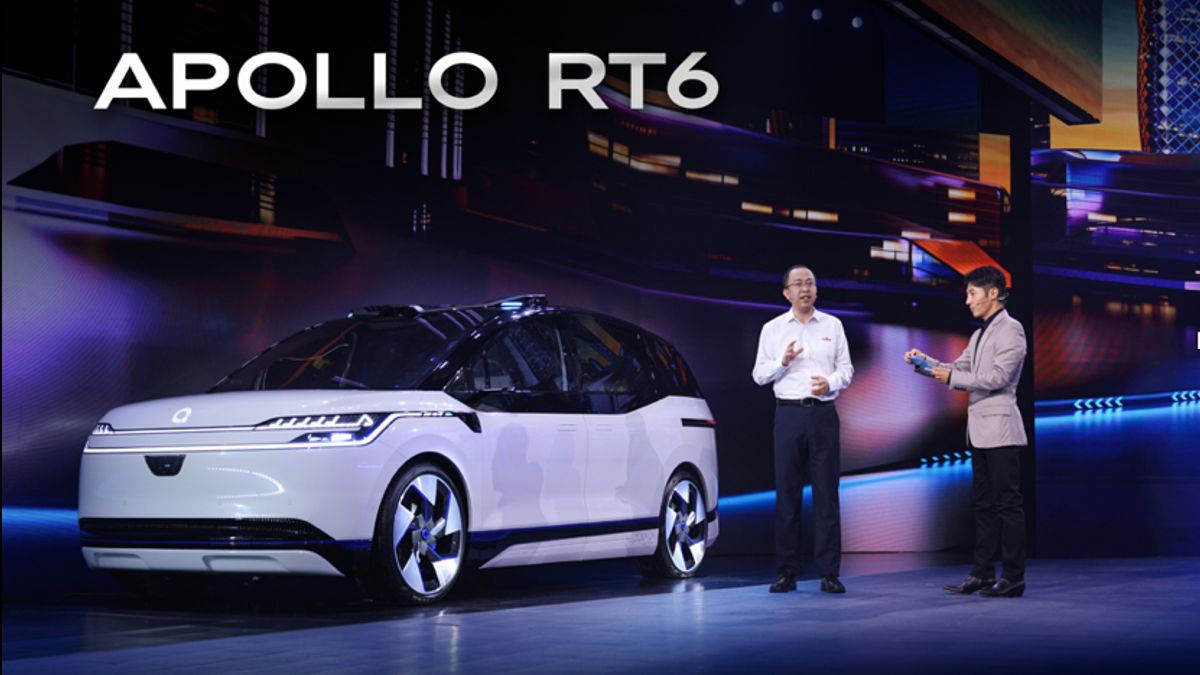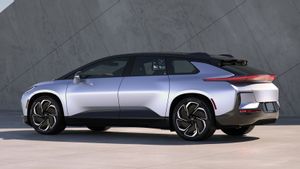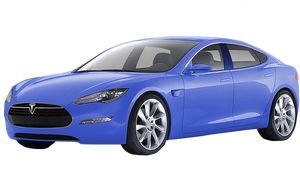JAKARTA - Chinese technology giant Baidu last week unveiled its new all-electric and self-driving car. This vehicle cost only 37.000 US dollars (IDR 554 million).
The car called Apollo RT6 has a removable steering wheel to provide more space for passengers. It can even be used with apps.
This is the first autonomous vehicle (AV) from Baidu that does not require retrofitting technology to conventional cars.
A senior company vice president at Baidu, which is called the Chinese version of Google, claims that this AV driving ability is equivalent to a skilled driver with 20 years of experience.
Baidu hopes to operate taxis in China in the second half of 2023 as part of Apollo Go, its autonomous vehicle ordering service.
Fully autonomous. All-electric. Production-ready. This is the Apollo #RT6 – Baidu’s next-gen autonomous vehicle, unveiled at #BaiduWorld2022. With a unit cost of just $37k, the RT6 is bringing the world one step closer to a driverless future. Read more 👉 https://t.co/PLzVH7b9Ds pic.twitter.com/vPvq6WgVpC
— Baidu Inc. (@Baidu_Inc) July 21, 2022
“This massive cost reduction will allow us to deploy tens of thousands of AVs across China,” said Robin Li, co-founder and CEO of Baidu, at the Baidu World 2022 technology conference.
"We are moving towards a future where taking a robotaxi will be half the cost of a taxi today," Li was quoted as saying by the Daily Mail.
The Apollo RT6 is Baidu's sixth generation AV, and its development costs are much cheaper than other models.
By comparison, Baidu launched the Apollo Moon, its fifth-generation unmanned vehicle, in June 2021, at a cost of around USD 71.000 for the driverless vehicle and kit.
The battery-electric RT6 can accommodate between two and four passengers depending on whether the steering wheel is activated or not.
The detachable steering wheel also allows for mounting desktops, game consoles, luggage racks, and vending machines within 15.6 feet by 6.1 feet of floor space.
According to Baidu, the 9.3-foot wheelbase makes it the size of an A-class car, but has the B-class car space and C-class car experience.
It's a cross between an SUV and a minivan, and offers 41 inches (105 cm) of legroom for the two seats positioned at the rear of the vehicle, on a completely flat floor.
The Apollo RT6 has a futuristic exterior with intelligent electric sliding doors, which can be opened via a Bluetooth connection, by password input, or by a phone app.
While driving, the AV uses 38 sensors, including eight light and range detection (LiDAR) sensors, 12 ultrasonic radars, 12 cameras and a six millimeter wave radar.
This helps the car to achieve more than 656 feet (200 meters) of accurate remote perception on all sides in complex urban environments.
This is Baidu's first vehicle model built on the Xinghe self-driving platform, and has a Level 4 automatic driving capability that is more powerful than the previous model.
Level 4 technology means the system can operate without a driver but must be preloaded with detailed maps, thus limiting the area in which the vehicle can operate.
The production-ready model uses seven 'redundant' systems, meaning a backup system can still function if one component or system fails.
Baidu said the safety of its new vehicle is supported by a total test mileage of more than 32 million kilometers (20 million miles).
However, under Chinese regulations, current autonomous cars still require the presence of a safe driver. No car has really been allowed to drive without a driver at all.
SEE ALSO:
Baidu hasn't revealed how many miles it can cover on a fully charged battery. But Baidu claims the Apollo RT6 will initially join the existing Apollo Go fleet as part of small-scale trials, but ultimately intends to launch 100.000 of them on the road.
Apollo Go has expanded to 10 cities in China, including Shenzhen, Shanghai and Beijing, since its launch in 2020, and has provided more than one million rides so far.
The company announced that on Wednesday, July 20 that it had also started charging fares in Beijing for driverless travel on its fifth-generation robotaxis, allowing it to commercialize its business.
Thanks to recent advances in manufacturing that lower production costs, Baidu plans to expand ride-hailing services to 65 cities by 2025 and 100 cities by 2030.
Baidu is best known for its search engine and online advertising services a la Google, but in recent years it has invested heavily in autonomous driving and artificial intelligence technologies, including automated personal assistants and AI chips.
China aspires to lead autonomous driving technology globally but lags behind the US in introducing the service. Alphabet's Waymo began offering driverless taxi services in Phoenix, Arizona in 2020.
The English, Chinese, Japanese, Arabic, and French versions are automatically generated by the AI. So there may still be inaccuracies in translating, please always see Indonesian as our main language. (system supported by DigitalSiber.id)


















